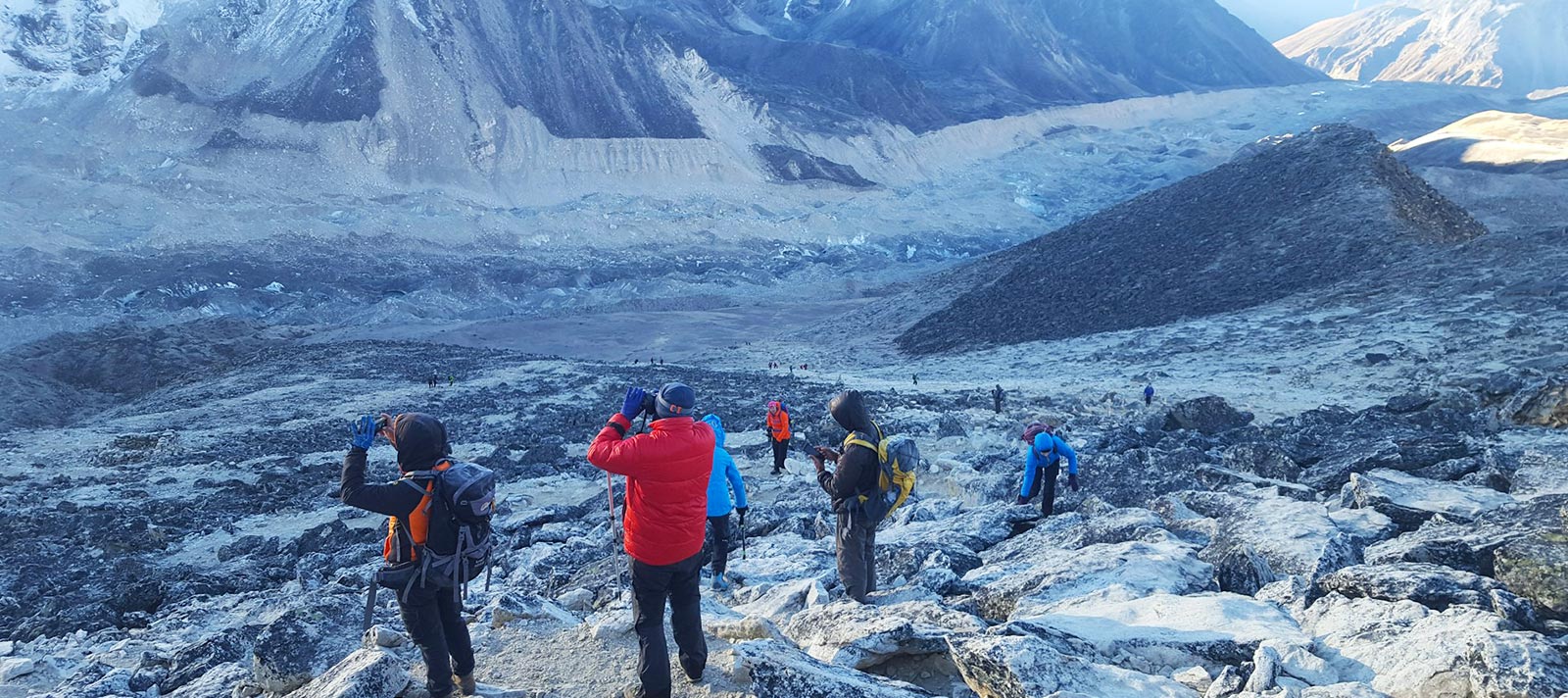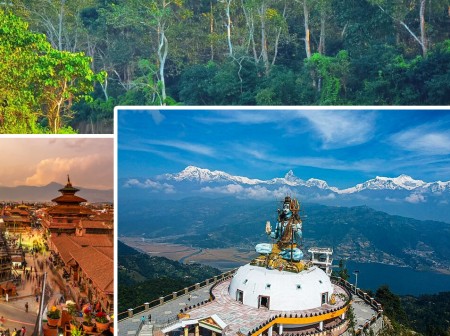
Everest Base Camp Trek Difficulty
- soleencounters
The Everest Base Camp Trek is a dream adventure for many. With its towering peaks, ancient Sherpa culture, and the iconic journey to the foot of the world’s highest mountain, it's no surprise that thousands take on this challenge each year. But how hard is it really?
Table of Contents
Understanding the difficulty of the Everest Base Camp Trek is essential before you commit. It’s not a technical climb, but the high altitude, rugged terrain, and daily trekking hours can be physically and mentally demanding. In this guide, Sole Encounters Trekking Pvt. Ltd. breaks down the challenges—from altitude and acclimatization to fitness requirements and terrain conditions—to help you prepare thoroughly and trek confidently.
Explore the Everest Base Camp Trek package
Is the Everest Base Camp Trek Difficult?
In short: yes, it’s challenging—but absolutely doable for anyone with decent fitness, mental determination, and the right preparation. The Everest Base Camp Trek is classified as a moderate to strenuous trek, primarily due to the altitude and length of the journey.
You don’t need prior mountaineering experience, but you must be prepared to walk 5–7 hours a day over varied terrain, often at high elevations above 3,000 meters.
Major Factors that Contribute to EBC Trek Difficulty
1. Altitude and Acclimatization
The most significant challenge of the Everest Base Camp Trek is altitude. The trek starts at Lukla (2,840 meters) and reaches a maximum elevation of Kala Patthar (5,545 meters). At these altitudes, oxygen levels drop, making breathing more difficult and increasing the risk of Altitude Sickness (AMS).
Key altitude checkpoints:
-
Namche Bazaar – 3,440m
-
Tengboche – 3,860m
-
Dingboche – 4,410m
-
Lobuche – 4,910m
-
Everest Base Camp – 5,364m
-
Kala Patthar – 5,545m
Acclimatization is critical. A well-paced itinerary includes at least two acclimatization days—typically in Namche and Dingboche—to help your body adjust. Learn more in our detailed guide on Altitude Sickness in Nepal.
2. Fitness Requirements
While you don’t need to be a marathon runner, a good level of cardiovascular fitness and stamina is essential. You’ll be walking continuously for up to two weeks over hills, rocky paths, and steep climbs.
Recommended physical preparation:
-
Start training 8–12 weeks before the trek
-
Include regular hiking with a backpack
-
Practice stair climbing and leg strengthening
-
Improve endurance with cardio workouts (running, cycling, swimming)
Our expert guides at Sole Encounters will support your pace, but pre-trek fitness greatly increases your enjoyment and success rate.
3. Length & Daily Trekking Hours
The standard Everest Base Camp Trek itinerary spans 12–15 days, with an average trekking time of 5 to 7 hours per day. Some days (like the hike to Kala Patthar) can be longer and more tiring, especially due to the cold and thinner air.
For full route details, view our Everest Base Camp Trek itinerary.
4. Terrain and Trail Conditions
The EBC trail is a mix of stone-paved village paths, dirt trails, suspension bridges, alpine meadows, glacial moraines, and rocky ascents. You don’t need technical climbing gear, but sturdy trekking boots and poles are essential.
Expect to:
-
Navigate narrow ridges and high passes
-
Cross swinging suspension bridges over deep gorges
-
Trek on loose rocks near Gorakshep and EBC
During early spring or late autumn, parts of the trail may be icy or snow-covered.
5. Weather Challenges
The weather in the Everest region can shift quickly. Even during trekking seasons, mornings may start clear and sunny, but afternoons can bring wind or snow.
Best seasons for the trek:
-
Spring (March–May): Mild temperatures, clear skies, blooming rhododendrons
-
Autumn (September–November): Stable weather, crystal-clear mountain views
Avoid winter (Dec–Feb) unless you're experienced with cold-weather trekking, and monsoon season (June–August) due to rain and landslide risks.
For seasonal guidance, visit our Trekking in Nepal activity page.
Common Challenges Trekkers Face
Here are some typical physical and logistical challenges:
-
Shortness of breath above 3,000m
-
Fatigue from sustained daily hikes
-
Cold temperatures, especially at night
-
Limited oxygen and sleep disturbances at high altitudes
-
Basic facilities: Tea houses are cozy but simple
We mitigate these by offering guided treks with acclimatization support, well-planned logistics, and qualified local staff. Talk to an expert to learn how we tailor your experience.
Tips to Make the Trek Easier and Safer
-
Follow a gradual ascent with proper acclimatization days
-
Hydrate constantly (3–4 liters per day)
-
Eat enough carbs to fuel your energy levels
-
Avoid alcohol and caffeine at high altitudes
-
Listen to your body and report symptoms of AMS early
-
Hire a porter if you're unsure about carrying your load
Choosing a trusted local company like Sole Encounters ensures safety, local insight, and a smoother journey.
Do You Need a Guide for the Everest Base Camp Trek?
While it's possible to trek solo, we highly recommend a guided trek for several reasons:
-
Local knowledge of terrain, culture, and emergency handling
-
Logistics support (permits, accommodations, meals)
-
Altitude management with pacing and acclimatization guidance
-
Cultural interaction through Sherpa guides and porters
Our guided Everest Base Camp Trek includes licensed English-speaking guides, all necessary permits, and personalized attention throughout the journey.
Is the Everest Base Camp Trek Right for You?
Ask yourself:
-
Can I walk 5–7 hours a day for over 10 days?
-
Am I prepared to deal with altitude and cold weather?
-
Do I enjoy mountain landscapes and rustic trail life?
If you answered yes to these, the Everest Base Camp Trek is well within your reach—with the right preparation and a positive mindset.
Conclusion
The Everest Base Camp Trek is a demanding yet deeply rewarding experience. While the high altitude and extended trekking days pose real challenges, they are entirely manageable with the right training, mindset, and local support.
At Sole Encounters Trekking Pvt. Ltd., we specialize in helping trekkers succeed—whether you're a first-timer or a seasoned hiker. We provide full preparation guidance, flexible itineraries, and expert support on the trail to ensure a safe and successful journey to the base of Mount Everest.
Ready to take on the challenge?
Explore the trip, talk to our experts, or contact us to begin your adventure.
Recent Posts
.jpg)
3rd Jul, 2025
.jpg)
4th Jul, 2025
.jpg)
4th Jul, 2025
.jpg)
7th Jul, 2025
.jpg)
8th Jul, 2025
.jpg)
8th Jul, 2025
.jpg)
8th Jul, 2025

10th Jul, 2025








